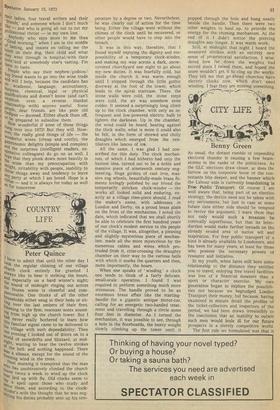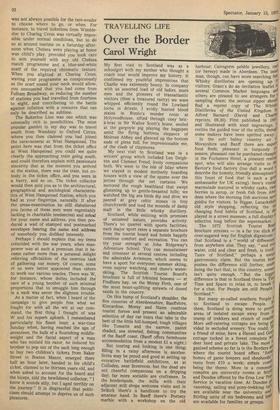CITY LIFE
Benny Green
As usual, the distant rumble of impending electoral thunder is causing a few brainstorms in the ranks of the politicians. As the GLC elections draw closer, so does the furrow on the corporate brow of the contestants bite deeper, and the banner which the Labour side is currently brandishing is Free Public Transport. Of course I am well aware that, being part of an election strategy, the device need not be taken with any seriousness, but just in case at some future date either side should be tempted to revive the argument, I warn them that not only would such a measure be comically superfluous, but that its introduction would make further inroads on the already eroded area of native wit and inspiration. For free public transport of a kind is already available to Londoners, and has been for many years, at least for those who possess the necessary powers of resource and initiative.
In my youth, when fares still bore some relationship to the distance they entitled you to travel, enjoying free travel facilities was less of a financial measure than a sport or character exercise. My own generation began to explore the possibilities not because we begrudged London Transport their money, but because, having examined in minute detail the profiles of the ticket-collectors and inspectors of the period, we had been drawn irresistibly to the conclusion that an inability to outwit such men would bode ill for our future prospects in a sternly competitive world.
The first rule we formulated was that it was not always possible for the fare-evader to choose where to go, or when. For instance, to travel ticketless from Wimbledon to Charing Cross was virtually impossible under normal conditions, but to do so at around teatime on a Saturday afternoon when Chelsea were playing at home was child's play, provided you took care to arm yourself with any old Chelsea match programme and a blue-and-white scarf of the required chromatic texture. When you alighted at Charing Cross, waving your programme as conspicuously as the scarf round your neck would allow, you announced that you had come from Fulham Broadway, so reducing the number of stations you had travelled from fourteen to eight, and contributing to the battle against inflation with a resource that can only be described as sublime. The Bakerloo Line was one which was unusually rich in possibilities. The most popular gambit in my day was to travel south from Wembley to Oxford Circus, where you then claimed you had joined the caravanserai at West Hampstead. The point here was that from the ticket office at West Hampstead you could see quite clearly the approaching train going south, and could therefore explain with passionate sincerity that at the moment you arrived at the station, there was the train, but nobody in the ticket office, and you were in a hurry, and so on. The ticket collector would then quiz you as to the architectural, geographical and sociological characteristics of West Hampstead Station, which you had at your fingertips, naturally. If after the cross-examination he still disbelieved you (some of these men were regrettably lacking in charitable tendencies) and asked for your name and address, you then produced a wad of stamped and postmarked envelopes bearing the name and address of somebody you disliked intensely.
Perhaps I should explain that my teens coincided with the war years, when manpower was at such a premium that it became rather more than a personal delight relieving officialdom of the onerous task of gathering our money. Of course, some of us were better appointed than others to work our various oracles. There was W, for instance, whose duties included the care of a young brother of such minimal proportions that to smuggle him through in a sack was never the slightest trouble.
As a matter of fact, when I heard of the campaign to give people free what we fought for with all the wit at our command, the first thing I thought of was W and his superb aplomb. I remembered particularly his finest hour, a war-time Sunday when, having reached the age of seventeen, the bulk of a flourishing middleweight and the facial aspect of a man who has mislaid his razor, he induced his brother to pop out of the sack long enough to buy two children's tickets from Baker Street to Boston Manor, emerged there half an hour later, handed in his child's ticket, claimed to be thirteen years old, and when asked to account for the beard and the biceps, told the bewildered collector, "I know it sounds silly, but I aged terribly on the journey." It is disgraceful that politicians should attempt to deprive us of such pleasures.











































 Previous page
Previous page